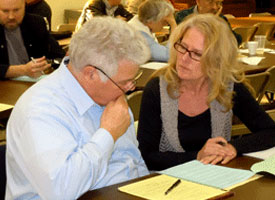By Roland Lovstad
The Rev. Mark Nebel recalls that when he began serving his first call at a small congregation in Southern Illinois, there were no children in the worship services.
“The mentality was ‘We’re too old, we’re too small, we can’t do anything,’ ” Nebel said as he described his rural and small-town experiences to the “Engaging Rural Communities ” event Jan. 28 at Immanuel L
The introduction led to Nebel’s description of how asset mapping helped that congregation find out how its members could serve — and, yes, eventually add children to the worship services. Nebel is now serving in his third call to a rural and small-town congregation — St. John Lutheran Church in Red Bud, Ill.
The “Engaging Rural Communities” event was the first of several to be offered this year by the Rural and Small Town Mission component of the LCMS Office of National Mission. About 25 people, from small towns in southeast Missouri and southern Illinois attended.
Nebel said asset mapping is designed to identify the resources that God provides in a congregation, adding that the foundational gifts are the Word and Sacraments. By looking at assets, he said, congregations can identify and assess the physical properties, the individual talents of members, associations within the community, collective strengths and financial resources.
Planners need “to connect the dots by finding the affinity between the assets and the opportunities to take action,” according to Nebel. Finally, he advised congregations to build partnerships with other congregations and community agencies. One of those partnerships is the one shared through The Lutheran Church-Missouri Synod, he added.
As it surveyed its “human assets,” Nebel’s first congregation recognized that it had a number of nurses and began a parish nurse program, offering health screenings and blood-pressure checks in the congregation and the community. The congregation also owned extra land and discussed partnering with another agency to build senior housing, but the agency chose another location.
“The addition of children into the congregation’s worship life simply came about as the work of the Holy Spirit as we preached God’s Word, visited members and showed love to people,” he added.
The Rev. Dr. Lee Hagan, interim director of Rural and Small Town Mission, opened the day’s program, telling participants, “Congregations in small communities have everything they need.”
“The point is that we have God’s promises,” Hagan stated. “The saints will be gathering and the Lord will be with His people. Where the Gospel is preached, where His gifts are given out, you have what you need. And you have what the world needs.”
Hagan also led an afternoon session on “Leading Change,” when he advised participants to listen, learn the history of the congregation and community, build relationships, and develop and communicate a shared vision. He also suggested reviewing the organizational structure, with an eye toward the difference in attitudes among generations.
The Lutheran Church Extension Fund provided every registered congregation with demographic data pertaining to a five-mile radius around their church. As she explained the material, Karen Siegel, office and human resources manager in the Missouri District, said LCEF can provide customized data tailored to areas that a congregation specifies.
Other Engaging Rural Communities events are scheduled for Feb. 25 at St. John Lutheran Church, Waverly, Iowa, and March 24 at St. John Lutheran Church, Easton, Kan. For more information, call 888-463-5127, ext. 314.
Roland Lovstad is a freelance writer and a member of Immanuel Lutheran Church, Perryville, Mo.
Posted Feb. 22, 2012
